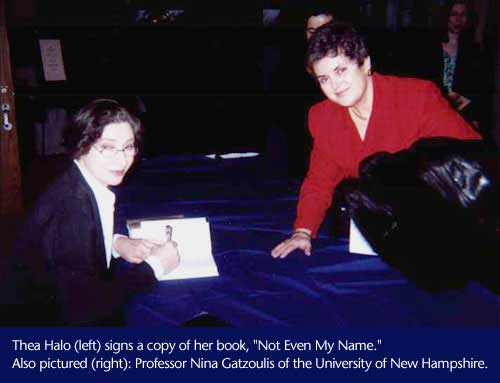 |
|||||||
 |
|||||||
 |
|||||||
| Noted author reads at Maliotis Center "It is amazing to me that some people shy away from such stories," said Panos Spiliakos, Pan-Macedonian Governor of New England. He was introducing Thea Halo, celebrated author of Not Even My Name, an account of the Pontic genocide that took place in the early part of the 20th century. "They suggest that 'for the sake of peace' we should not remember," Spiliakos continued. "The opposite is true. We owe it to the survivors as well as the dead to preserve their legacy and remember it forever -- not out of hate for the villains, but out of love for humanity." On April 1st, at the Maliotis Center in Brookline, Thea Halo signed books and gave a lecture on the tormenting story of her mother, Sano. In compelling words, she described the death march of the expelled Pontic Greeks from the northern region to the southern part of Turkey. Reading and commenting on passages from her book, Halo captivated her audience. "You are to leave this place. You will have three days to gather your things. You will take only what you can carry." With an officer's shouts, the three-thousand-year history of Pontic Greeks in Turkey came to a violent end. Stripped of everything she had ever held dear, young Sano saw her family members perish, one after the other. The reader follows Sano as she survives the death march and eventually arrives in America, married to a man three times her age. We see her transform from an innocent village girl into a nurturing mother of a twentieth century family in a new country. Responding to a question asked during the discussion period, the author informed the audience that her mother, Sano, recently received the Excellence of Women in History award from Governor George Pataki, governor of New York. She also said that the book would shortly be available in the Greek language as well. Many professors from various universities have expressed interest in including Halo's book in their curriculum. The author informed the audience that the book would be available to students in paperback form by the end of May and it will contain a more expanded historical section. While writing the book, Halo said, she became aware that very few people had ever heard of the uprooting of Pontic Greeks from their ancestral land. The Federation of Hellenic-American Societies of New England, AHEPA District 8, Anatolia College, The Maliotis Center and the Pan-Macedonian Association of New England sponsored the April 1st lecture at the Maliotis Cultural Center. Thea Halo was born in New York, where she studied Art and Architecture. Her first career was in art. But seven years ago, she decided to write her mother's story. She mentioned that she found writing quite challenging because, as she explained, "writing is all the arts in one." During the question and answer session, one audience member asked Halo how much of her own imagination had gone into telling her mother's story. "The story is my mother's," Halo said with a smile, "but the sunsets are mine." -- Nina Gatzoulis |
|||||||
|
|||||||
